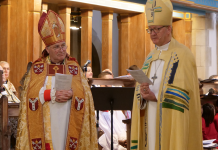“Therefore, since it is by God’s mercy that we are engaged in this ministry, we do not lose heart” (2 Cor. 4:1).
We write as Communion Partner Bishops present at the 80th General Convention of The Episcopal Church held in Baltimore from July 7 to 11, 2022. St. Paul’s words to the Church in Corinth are an inspiration to us, as we reflect on our experience and speak a word of encouragement to the members of our own Church. We believe there are both challenges and grounds for hope as we engage in our ministries as bishops in the Church of God.
The source of our hope is the mercy of God, shown forth in the death and resurrection of our Lord Jesus Christ, and in his coming again. This is the ground of the Church’s life, and of all ministry. It is the good news that every member of the Church is sent to proclaim, in the power of the Holy Spirit.
This Convention was challenged by the ongoing effects of the pandemic, imposing unique constraints upon our work. Controversial resolutions were placed upon consent calendars where they did not belong. Discussion of complex and difficult issues was engaged in, and action taken, within the framework of a much shorter Convention. Time for reflection was extremely limited.
We are grateful for the collegial atmosphere of the House of Bishops, and for the collaborative way in which the bishops worked together. We believe that all continue to seek “a lasting path forward for mutual flourishing consistent with this church’s polity,” as called for in the charge given to a renewed Task Force on Communion Across Difference at this Convention (Resolution 2018-A227; Resolution 2022-A056). We give thanks to God for our colleagues. We are hopeful as we look forward to the work ahead of us as bishops, with a pastoral charge of guarding “the faith, unity, and discipline of the Church” (BCP, p. 517).
Our concerns center on the challenge of Prayer Book revision of the marriage rites, likely to be brought forward at the General Convention in 2024. The Book of Common Prayer has a unique place in our Anglican identity. Our Constitution speaks of “the historic Faith and Order as set forth in the Book of Common Prayer” (Preamble). More to the point, those ordained undertake “to conform to the doctrine, discipline, and worship of The Episcopal Church” (BCP, 513, 526, 538). A change in the Church’s teaching about marriage, included in the Prayer Book, raises extremely difficult issues for ordinands and for members of the Church who uphold the traditional teaching that “Christian marriage is a solemn and public covenant between a man and a woman in the presence of God” (BCP, 422).
Much work remains to be done and will require us to create a path forward. A lasting canonical provision must be made to accommodate those upholding this teaching. In addition, the memorialization of the 1979 Book of Common Prayer “ensuring its continued use” (Resolution 2018-A068) should find effective expression in our canons. If we are to be a church with differentiated teaching on marriage, with latitude afforded to our members, the church’s traditional teaching will need expression in liturgies, rubrics, and catechisms that continue to be authorized by this Church, and freely available to its members, for liturgical use and as an adequate expression of their faith.
Along with other members of our Church, we lament the lasting effects of racism, colonialism, and imperialism upon the life of the Body of Christ. At the same time, we celebrate the genuine affection that the members of the Church have for the Book of Common Prayer. We do not see the church’s Prayer Book as a document of oppression. In many places throughout the Anglican Communion, and in our own Church, authentically indigenous churches joyfully use liturgical formularies formulated in the past, often in places far removed. They cannot, with any credibility, be faulted for perpetuating oppression by using the traditional Prayer Book.
Along with other concerns, we note the passage of a resolution on abortion, upholding access to abortion “with no restriction on movement, autonomy, type, or timing” (Resolution 2022-D083), an example of a controversial resolution brought to the floor of Convention without sufficient preparation and against which we spoke and voted. We are grateful, in the House of Bishops, for the expressed desire for nuanced political statement that does not simply increase polarization within the Church and within society.
As bishops in the Church, we continue to place our hope in the mercy of God, and in the death, resurrection, and the return in glory of Jesus Christ our Lord. We are full of hope as we live out our call as Christians to share the good news. We look forward to our participation in the Lambeth Conference later in the summer, and to the inspiration in faith of other colleagues from all over the world. We continue to encourage the members of the Church as they pursue their ministries in these times of challenge and hope.
The Rt. Rev. John C. Bauerschmidt
Bishop of Tennessee
The Rt. Rev. Gregory O. Brewer
Bishop of Central Florida
The Rt. Rev. Brian K. Burgess
Bishop of Springfield
The Rt. Rev. Francisco Duque-Gómez
Bishop of Colombia
The Rt. Rev. Fraser Lawton
Assistant Bishop of Dallas
The Rt. Rev. Moises Quezada Mota
Bishop of the Dominican Republic
The Rt. Rev. Juan Carlos Quinones
Bishop of Ecuador Central
The Rt. Rev. David M. Reed
Bishop of West Texas
The Rt. Rev. Michael G. Smith
Assistant Bishop of Dallas &
Assisting Bishop of Albany
The Rt. Rev. George R. Sumner
Bishop of Dallas










